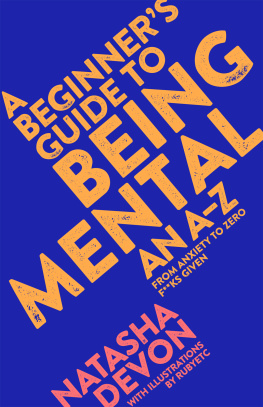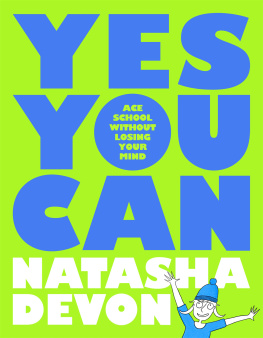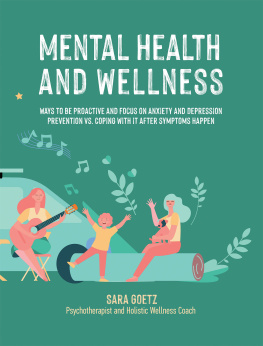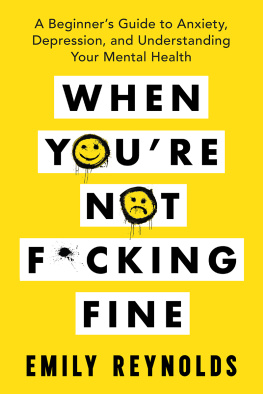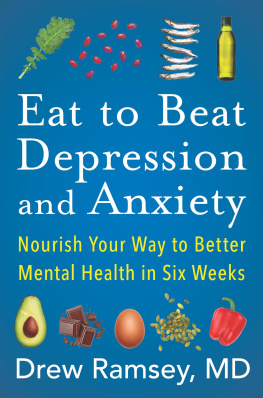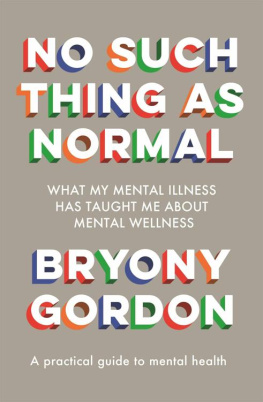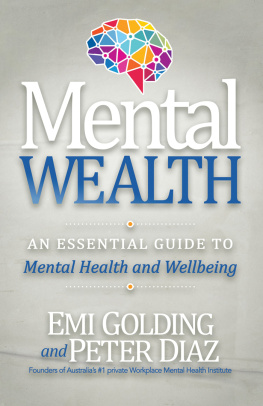For Marcus, my madness enabler.
CONTENTS
(panic attacks, OCD, PTSD)
(antidepressants, antipsychotics)
(exercise, art, music)
(eating disorders, nutrition)
(including mental health of NHS workers)
(pro-anorexia/self-harm websites, social media, trolling, where to find reliable information)
(self-harm)
(signs and symptoms)
(depression, postnatal depression, SAD, suicidal behaviours)
(politics)
(advantages of mental illness)
(bipolar, cyclothemia, schizophrenia)
(sexuality and mental health, LGBT+ specific issues)
(sleep, mindfulness)
(NHS, CBT, counselling, NLP)
(healthy expression of anger)
(gender and mental health)
(hormones, adolescence, perinatal mental health, special educational needs (SEN), mental health at university)
BEING MENTAL, AN INTRODUCTION
From the moment you were born it was acknowledged that you had a body and therefore a physical health. As you progressed through life, the chances are you were given information which helped you to identify when your physical health was waning and measures you could take that would assist with physical health maintenance. Most people had the importance of eating their vegetables drummed into them by the time they were five years old. As we progress though childhood we are made aware of the benefits of fresh air and exercise. Via this cumulative process, the majority of people have been primed to monitor their body both constantly and instinctually.
When it comes to mental health, however, we tend to wait until an issue arises before giving it any consideration. Were told one in three people will experience symptoms of a mental illness during their lifetime and we fervently cross our fingers, hoping that we will dwell within the other two thirds.
My work as a campaigner is both broad and varied, but it can essentially be summarized as an attempt to make our social mental-health model more closely resemble its physical counterpart. For, whilst statistically one in three of the population will struggle with their mental wellbeing in a way that is recognized within the scope of medical diagnostic criteria, three in three people have a head with a brain in it.
We all exist somewhere within a spectrum of mental health. The options are not restricted to either mentally ill or fine, there are infinite variables which exist in between the binaries. This book represents my attempt at a mind manual, designed for use by anyone with a brain. Which is everyone.
I dont know about you, but I find the notion of being alone in my own head to be simultaneously the most exhilarating and terrifying aspect of my existence on this topsy-turvy planet. I can create intimacy with other people in a variety of different ways, yet they will never truly understand what it is like for me to exist within the weird and wonderful confines of my mind, or vice versa.
Our neurological solitude can, in turn, make effective communication a tricky landscape to navigate. Even as you read this, thoughts which have exited my mind, with all its intricacies and peculiarities, and been committed to paper will pass through the filters of your values, beliefs and experiences and change shape, to take on new meanings. As a writer, the process of reader interpretation can be exciting. Sometimes people quote my work back at me in their own words and make it sound far more profound and important than it seemed when it was reverberating around my skull. At other times it can feel like a violation, like when I wrote an article about how the patriarchy is not the same as men and had all these terrifying alt-right types congratulating me on Twitter for articulating the failings of feminism as a movement and I felt how I imagined Nietzche must have when Hitler wrongly interpreted his work and used it to justify mass genocide. Although, obviously, on a much smaller scale.
The above challenges are never more pronounced than when we are using emotional vocabulary to describe our mental health. This is for two reasons. Firstly, English-speaking people have a very limited number of words with which to have conversations about feelings. This is despite the English language having more words overall than any other.
We have words which describe phenomena were very unlikely to encounter on a day-to-day basis, yet here are just a few of the feelings I experience regularly which require (in my opinion) altogether too many words to convey:
The feeling of YESSS when you arrive on a station platform to see the train you need pulling in and the fleeting, egotistical sensation that the universe has conspired in that moment to make your day as convenient as possible;
The realization that you and a formerly close friend have outgrown each other and sadness at the loss, mingled with acceptance of your respective personal evolutions;
The slight discomfort of having an entire Sunday stretched out ahead with no fixed plans, knowing that you ought to make the most of it before work on Monday and experiencing a niggling guilt at all the productive ways you could spend the time in the face of an overwhelming desire to sit on your arse and devour an entire series on Netflix whilst eating items of little to no nutritional value;
The first time a new acquaintance who you think is amaaaazing does or says something distinctly less-than-amazing and you abruptly realize that you need to reconcile their true self with the constructed version of them you have built in your head;
The energy it takes to suppress the urge to swear when in official/family-based or child-centred situations;
Knowing something is bothering you but not being able to put your finger on what, precisely;
The nanosecond when you know with absolute certainty that a panic attack is inevitable;
The nanosecond when you know with absolute certainty that an orgasm is inevitable;
The few blissful moments after you wake from sleep after a catastrophic life event, like the break-up of a relationship or a bereavement, when you have forgotten to feel sad;
The terrible seconds that follow, when it all comes flooding back;
The dual sensation of being desperate to know what happens next yet not wanting to finish a book because youre enjoying it too much.
Other languages dont have these sorts of problems. In Greek, for example, they have four different words to describe distinct types of love. The glorious German language has a word for absolutely everything, so much so that weve had to steal a few, like schadenfreude. Germans can also choose from fifteen words for different types of anger, which makes total sense to me: it doesnt feel the same every time I am angry.
My theory is that emotional and mental vocabulary in English is incredibly restricted as a direct result of the fact that English was first given to the world by British people, who are traditionally perceived not to have feelings and emotions, eschewing them in favour of a cup of tea and a stiff upper lip. This can render English a rather inadequate tool for having emotional and mental health-based conversations and means that there are often misunderstandings and miscommunications. Mental health is, quite rightly, forefront on our social agenda in 2018, but were having this huge, transformative, international conversation at cross purposes.
For example, people regularly say theyre depressed or having a panic attack when they are quite clearly neither and those who have experienced them as clinical conditions become (understandably) upset. But what if they arent trying to diminish mental illness and are simply bewildered by all the conflicting information in the world, or stuck because the word for how theyre feeling doesnt exist?

